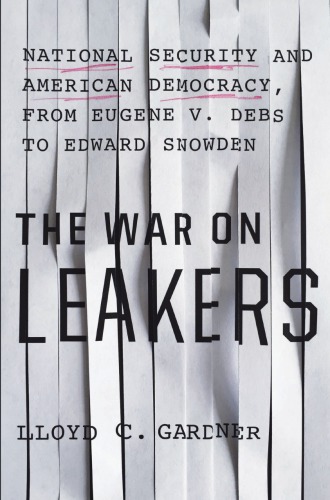
The War on Leakers
National Security and American Democracy, from Eugene V. Debs to Edward Snowden
کتاب های مرتبط
- اطلاعات
- نقد و بررسی
- دیدگاه کاربران
نقد و بررسی

December 15, 2015
Who poses the greater threat to the United States: the spymasters and their "enormous power" or the leakers "who occasionally expose them?" Add still another blow to Woodrow Wilson's tottering historical reputation. As a World War I security measure, Wilson proposed the Espionage Act of 1917--he tried vainly to get press censorship into the law--and used it instead to suppress dissent, most notoriously against Eugene Debs, Socialist Party leader, imprisoned for giving anti-war speeches. With the rise of the national security state during and after World War II, succeeding administrations have persisted in using the act not so much to punish foreign agents but rather to go after protestors and leakers, most famously Daniel Ellsberg in 1971 for supplying the Pentagon Papers to the New York Times. Since 9/11, intelligence agencies have accrued even more power and have employed the act and other laws to pursue the likes of Bradley Manning and Edward Snowden, to ensnare journalists--Glenn Greenwald, James Risen, and Michael Hastings, among others--who convey classified information not to the enemy but to the public. Near the end of his well-written, tightly argued discussion of these and other cases, Gardner (Emeritus, History/Rutgers Univ.; Killing Machine: The American Presidency in the Age of Drone Warfare, 2013, etc.) declares that the intelligence community has become "the unacknowledged supreme master of the federal government." By threatening aggressive investigatory journalism, by shielding government malpractice, by violating the separation of powers doctrine, intelligence agencies have done more, he writes, to undermine our democracy than to make us safe. Adding to Gardner's credibility is his willingness to be as harsh on Barack Obama as on George W. Bush and his accommodation of such voices as Sean Wilentz, Michael Kinsley, and George Packer, all of whom have been critical of either the methods or character of the whistleblowers. A worthwhile contribution to our ongoing national debate about the balance between national security and privacy and about the line between sedition and dissent.
COPYRIGHT(2015) Kirkus Reviews, ALL RIGHTS RESERVED.

February 15, 2016
The Espionage Act of 1917, designed to prevent disclosure of information deemed vital to national security, has been used to silence critics, intimidate whistle-blowers, and imprison well-meaning citizens, or so Gardner argues in this engaging and thoroughly researched investigation. Gardner examines the historical precedent set by high-profile cases, including Eugene V. Debs, a Socialist Party leader who opposed America's participation in WWI, and Daniel Ellsberg, who leaked classified revelations about the Vietnam War and found himself at the center of the Watergate scandal. Gardner devotes the most compelling sections of the book to recent incidents, notably that of Edward Snowden, infamous NSA whistle-blower, and the freewheeling autonomy claimed by the CIA as it conducted enhanced interrogation techniques and worked to suppress a torture report in the Senate. Throughout, an uncomfortable question underscores Gardner's concerns: To what extent should citizens sacrifice individual liberties under the guise of Homeland Security? These issues are as relevant as ever, given the fact that the Obama administration has invoked the Espionage Act more than any other presidency.(Reprinted with permission of Booklist, copyright 2016, American Library Association.)

























دیدگاه کاربران